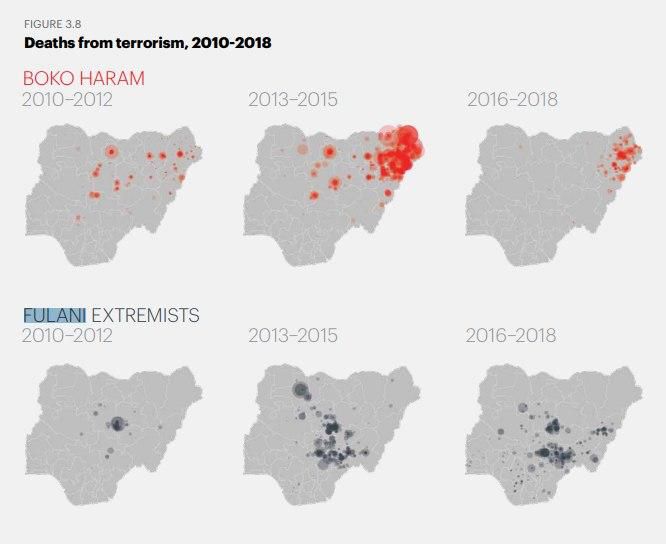Fulani herdsmen killed nearly 1,700 people in 2018, says Global Terrorism Index report
)
Nearly 1,700 violent deaths have been attributed to Fulani herdsmen in attacks carried out between January and September 2018, according to the 2018 Global Terrorism Index.
The GTI, which measures the impact of terrorism across the world, estimated in its new report that Fulani herders have killed six times more people than those killed by terrorist group, Boko Haram, in 2018.

The struggle for economic resources like land and water between farmers and nomadic cattle herders, usually of the Fulani extraction but not exclusively, has led to a lot of bloodshed in the country in 2018.
Countless attacks have been attributed to herders after an escalation of simmering tension with local farming communities, tension that was worsened by the implementation of anti-open grazing laws in Benue and Taraba, two of the worst-hit states.
Even though the report noted that Fulani extremists were less active in 2017, with deaths dropping by 60% to 321, and attacks dropping by 51% to 72, the group has been on rampage in 2018.
The report read, "While deaths committed by Fulani extremists decreased following the peak of 1,169 deaths in 2014, violence from the group in 2018 is expected to surpass that peak. Nearly 1,700 violent deaths have been attributed to the Fulani Ethnic Militia from January to September 2018. An estimated 89% of those killed were civilians."
The report noted that the large-scale violence is perpetrated by both sides "who engage in mass village raids" that involve wanton violence.
"78% of the deaths committed by Fulani extremists since 2010 have been carried out as armed assaults," the report indicated.
The report also disclosed that the Fulani Ethnic Militia is the deadliest of the bunch of Muslim Fulani herdsmen who have taken up arms against farmers in largely Christian areas.
The report read, "The Fulani herders are primarily Muslim while the southern farmers are predominantly Christian, which adds a religious dimension to the conflict over resources. Christian farmers in the south perceive the influx of Muslim herders as an Islamisation of the country at a time when Boko Haram's presence in the country is still strong."
The GTI report noted that the escalation is as a result of population growth, desertification and the distribution of arms throughout Nigeria. It also described the conflict as an economic plight which has forced herders to aggressively push into the south to feed their cattle.
The report read, "Land scarcity, the over use of resources, and climate change have dried up fertile land in Northern Nigeria which the Fulani have historically used for grazing, driving many further south into states inhabited by farmers.
"At its core, the herder-farmer violence occurring in Nigeria revolves around the economic plight resulting from the worsening drought and land degradation in Nigeria's northern regions. The livelihood of Nigeria's Fulani population is threatened as desertification of their land pushes them south.
"Crop yields of Nigeria's central and southern-based farmers, on the other hand, are threatened as grazing practices destroy crops due to the increased presence of cattle.
"As such, the deterioration of land in both Nigeria's northern and southern states has the long-term potential to disrupt the Nigerian agricultural and livestock economy and devastate the region even more."
The report identified Benue, Plateau, Kaduna and Taraba as the deadliest states in Nigeria for these clashes.
National Livestock Transformation Plan
Open grazing has been roundly condemned and blamed as the reason why cattle herders clash with local farming communities over the control of land all over the country, with such clashes leading to the death of hundreds over many years.
In June 2018, the federal government presented the National Livestock Transformation Plan, a N179 billion 10-year initiative targeted at putting an end to the agelong herders-farmers crisis, and to massively improve the livestock industry. The initiative stipulates that ranching is the way forward for cattle rearing in the country.
Under the federal government's plan, cattle herders are expected to be registered and recognised with cooperatives for the purpose of the ranching scheme. These cooperatives will then be able to get rental agreements for land from state governments and also benefit from ranch resources on several terms including loans, grants, and subsidies.
The funding of the plan from the federal government and state governments is expected to last for the first three years in the pilot phase for a total of N70 billion while private sector interests and investment between the third and tenth year is expected to be in excess of N100 billion.
The proposed ranch size models, according to the plan, is a cluster of 30, 60, 150 and 300 cows ranched in a location within the donated reserves.
Adamawa, Benue, Ebonyi, Edo, Kaduna, Nasarawa, Oyo, Plateau, Taraba, and Zamfara have been selected as the pilot states to launch the plan, with 94 ranches to be established and operational in clusters of 4 ranches in 24 locations in those states.
Of the 10 states designated as pilot states, the governments of Benue State and Ebonyi State have publicly denied agreeing to provide land for the federal government's initiative.
While updates on the plan have been shrouded in mystery for months, the Minister of Agriculture and Rural Development, Audu Ogbeh, announced last week that it will be implemented soon.

![Aisha blows hot on Security forces; Y7ou won't believe what she said [VIDEO]](https://image.api.sportal365.com/process/smp-images-production/pulse.ng/17082024/1f976edf-1ee2-4644-8ba1-7b52359e1a8f?operations=autocrop(640:427))
)
)
)
![Lagos state Governor, Babajide Sanwo-Olu visited the Infectious Disease Hospital in Yaba where the Coronavirus index patient is being managed. [Twitter/@jidesanwoolu]](https://image.api.sportal365.com/process/smp-images-production/pulse.ng/16082024/377b73a6-190e-4c77-b687-ca4cb1ee7489?operations=autocrop(236:157))
)
)
)
)
)
)
)
)
)
)
)